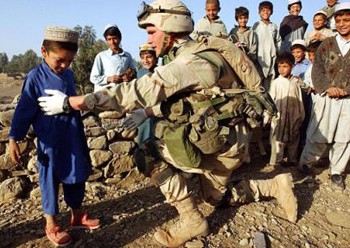The Guardian, August 17, 2007
US military suicides at highest rate for 16 years
... soldiers at Fort Bragg in California killed their wives and themselves after returning in 2002 from the war in Afghanistan
Ewen MacAskill in Washington
The strain on US forces of fighting in Iraq and Afghanistan was exposed yesterday when the Pentagon published a report showing that the number of suicides among US troops is at its highest level since the 1991 Gulf war.
Although the figures are relatively small amid the carnage in Iraq, the Pentagon is concerned about growing and disturbing trends. Longer and more frequent deployments are adding to pressure on troops. One of the biggest causes of concern is that there has been a jump of more than 30% in the number of suicides in combat zones.
The number of suicides in 2006 jumped to 99, with a further two as yet unconfirmed by medical examiners. There were 102 suicides in 1991 when the US deployed 500,000 troops to Kuwait and Saudi Arabia for the first Gulf War.

"War on Terror" in Afghanistan!
Post-traumatic stress as a result of combat is blamed, as well as break-up of relationships and financial worries. Twenty-eight of the deaths in 2006 were in Iraq or Afghanistan.
The report found a significant relationship between suicide attempts and the number of days deployed in Iraq and Afghanistan. Troops also face difficulties when they return home, often finding it hard to readjust.
The Pentagon is alarmed by the figures for this year so far, 44, 17 of which have been in Iraq or Afghanistan. The rise in 2006 came in spite of a sustained campaign launched by the Pentagon two years ago to raise awareness of the issue.
The figure of 99 deaths is up from 88 in 2005, 67 in 2004, and 60 in 2003, when the US invaded Iraq.
The US military is spread thin because of the wars, with 154,000 troops in Iraq and 26,000 in Afghanistan.
The suicide rate for women serving in the wars was about twice that of women who were not sent to war, the report said.
US officials said that while the eventual figures for this year may show a drop from last year, they were concerned that the proportion of those in Iraq and Afghanistan could increase.
New, extended deployments only came into effect this year, when the length of service in Iraq was increased from a year to 15 months. Deployments are also coming around with greater frequency, with much less time at home for recuperation and training.
The lengthy deployments are especially disruptive for the National Guard, the part-time soldiers who have to take temporary leave from civilian jobs. Although their jobs are supposed to be protected by law, some have come back to find they have been passed over for promotion or eased out altogether.
There has been an overall increase in mental illness. The Pentagon evacuates 20 to 40 soldiers from Iraq every month because of mental problems. Most are taken to the psychiatric clinic at the Walter Reed hospital in Washington.
About 20% of troops in Iraq show signs and symptoms of post-traumatic stress. About 35% seek some kind of mental health treatment a year after returning home.
The army has been recruiting more psychiatrists over the last few years. It began offering more counselling to returning troops after soldiers at Fort Bragg in California killed their wives and themselves after returning in 2002 from the war in Afghanistan.
Characters Count: 3828
